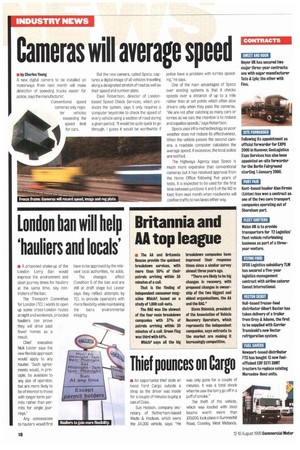Cameras will average speed
Page 12

If you've noticed an error in this article please click here to report it so we can fix it.
• by Charles Young A new digital camera to be installed on motorways from next month will make detection of speeding trucks easier for pokes, says the manufacturer.
Conventional speed cameras only regis ter vehicles exceeding the speed limit for cars. But the new camera, called Specs, captures a digital image of all vehicles travelling along a designated stretch of road as well as their speed and number-plate.
Dave Robertson, director of Londonbased Speed Check Services, which produces the system, says it only requires a computer keystroke to check the speed of every vehicle using a section of road during a given period. 'It would be quite quick to go through. I guess it would be worthwhile if police have a problem with lorries speeding, he says.
One of the main advantages of Specs over existing systems is that it checks speeds over a distance of up to a mile rather than at set points which often slow drivers only when they pass the cameras. We are not after catching as many cars or lorries as we can: the intention is to reduce and equalise speeds," says Robertson.
Specs uses infra-red technology so poor weather does not reduce its effectiveness. When the vehicle passes the second camera, a roadside computer calculates the average speed. If excessive, the local police are notified.
The Highways Agency says Specs is much more expensive than conventional cameras but it has received approval from the Home Office following five years of tests. It is expected to be used for the first time between junctions 4 and 5 of the M2 in Kent from next month when roadworks will confine traffic to two lanes either way








































































































